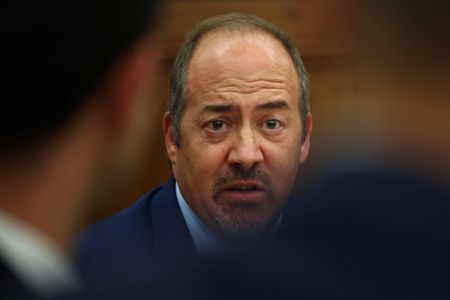By Jan Strupczewski
BRUSSELS (Reuters) – The European Union is unlikely to agree on a reform of its fiscal rules this year and talks are likely to take up most of next year too, leaving the bloc in a quandary over what framework to use in 2023 to cautiously reduce spending, EU officials say.
The rules, called the Stability and Growth Pact, limit government borrowing to protect the value of the common euro currency shared by 19 countries.
They have been suspended since 2020 to give governments leeway to fight the COVID-19 pandemic.
With growth now back on track, the rules were to be reinstated from the start of 2023, though with changes that would acknowledge the EU’s new economic realities – the high post-pandemic public debt and the need for huge public investment to fight climate change.
But the European Commission will only present its proposals on how to change the Stability and Growth Pact in June, officials said.
That leaves only a few months after EU institutions return from the summer break to reach a deal on a very complex and politically sensitive issue.
“A complete revision of the Stability and Growth Pact is unlikely before the end of the year,” said Markus Ferber, a member of the European Parliament’s economic committee that will co-decide on the changes to the rules.
“Even if the Commission sticks to the current timeline of having a proposal by mid-year, which I would not necessarily rely on, half a year is considerably too short for the legislative process to unfold,” he said.
“You should expect the legislative process to take at least a year, likely longer.”
DEBT REDUCTION, GREEN INVESTMENT
Officials said that, from the publication of the Commission proposals in June, the legislative process of hammering out the changes between European governments and the European Parliament would likely take between a year and 18 months.
“I see no agreement before end 2023 at the earliest.
For that reason the guidance of the Commission for 2023 will be extremely important,” said a senior euro zone official involved in the talks on changing the rules. “The longer the discussion takes the more difficult it will become.”
Governments, however, are already aware that fiscal support to the economy has to fall, with or without new rules in place.
“It is reasonable to assume that the level of fiscal support will be lower than what it is now.
This is the logic of fiscal rules and makes sense when the recovery is in a more advanced stage,” the chairman of euro zone finance ministers, Paschal Donohoe, said on Wednesday.
The revision aims to set up a new system that would provide a realistic debt reduction path to EU governments.
The current debt rule, set up a decade ago, is far too ambitious for countries such as Greece or Italy struggling with a debt pile of more than 200% and close to 160% of GDP respectively.
Neither is there any provision now to provide for investment – which the Commission estimates at more than half a trillion euros annually of private and public money for the next decade – needed to cut CO2 emissions to a net zero by 2050 to mitigate the worst impacts of climate change.
Among the ideas now under consideration is exempting such “green” government investment from EU calculations of budget deficits, which have to be kept below 3% of GDP.
But officials say it would be very hard to agree what is “green” investment, opening the rule to abuse. The depth of divisions over what is sustainable has been laid bare by the EU’s battle over its “green taxonomy” now under way.
TRANSITION PHASE?
With no new framework ready for the moment when rules are to be reinstated, the EU has the option of returning to unrealistic rules next year, suspending the rules for longer, or muddling through with a flexible interpretation of the existing rules.
“I don’t think there will be any transition rules.
What would be the point? Agreeing on those would be just as complicated as agreeing on a reform itself,” a second senior euro zone official involved in the talks said.
The Commission will say in early March what criteria governments should use to plan budgets for 2023, providing a taste of how the rules quandary could be solved.
“My preferred way would be to simply apply the old set of rules until we have a new one,” Ferber said.
“In general, we do not have any time pressure for the Stability and Growth Pact reform.
We have a regime in place, that might have some flaws, but the world will not end if we have to fall back on it.”
(Reporting by Jan Strupczewski; Editing by Alex Richardson)










